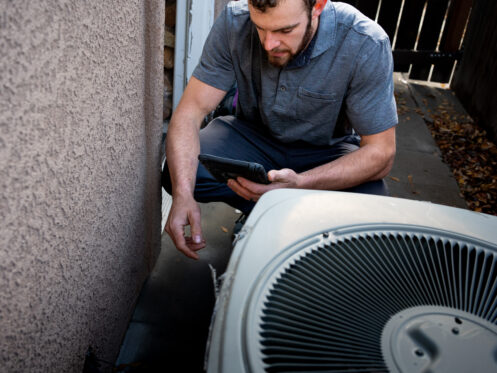Your air conditioner is your best tool against the hot temperatures outside. Like many pieces of machinery, it requires installation and maintenance to make sure that it functions effectively. While it doesn’t happen too often, it’s possible to find your AC’s outdoor unit sinking into the ground, which can lead to a range of problems, including reduced efficiency, increased wear and tear, and potential damage to the unit.
There are many factors that contribute to a sinking air conditioner, such as soil erosion, ground movements, and improper installation. If your AC seems to be sinking, it’s probably related to at least one of these common causes.
Improper Installation
The leading cause of an air conditioner unit sinking is improper installation. If you have an AC unit that is not on a stable and well-prepared foundation, it is vulnerable to sinking and shifting over time. The weight of the unit, combined with vibrations, can cause significant movement if the foundation is not adequate. A stable base typically requires a solid concrete pad or a properly compacted gravel bed to distribute weight properly. If the base material is insufficiently supportive and not even, the unit will start to sink as the ground settles.
Soil Erosion
Soil erosion is a natural process that can significantly impact the stability of your home’s AC unit. Over time, water runoff from irrigation or rain can wash away the soil that supports the AC unit, which leads to sinking. Poor drainage systems may make this problem worse by allowing water to accumulate around the base of the unit, increasing the amount of erosion. Soil erosion is typically an issue when there is heavy rainfall and improper drainage. Having a well-designed system that directs water away from the air conditioning unit can prevent soil from washing away, protecting the unit from sinking.
Poorly Compacted Soil
Poorly compacted soil under an AC unit is a common reason for it to sink. Gradual setting leads to an uneven foundation, which causes the AC unit to start to tilt or even sink. Proper soil compaction involves mechanically compressing the soil to increase its stability and density. This way of compacting the soil helps support the heavy equipment placed on top of it. Without this step, the soil remains loose and prone to shifting.
Heavy Rainfall
Heavy rainfall can have a big impact on the stability of your AC unit. Excessive rainwater can saturate the soil around the unit, causing it to become soft and less supportive. When you have waterlogged soil, it loses the ability to hold its shape and strength. This can lead to the gradual sinking of the AC unit. This is another reason why it’s important to have adequate draining around your air conditioning unit.
Ground Shifting
The ground under an air conditioning unit can start to shift due to the natural movements of the earth. Factors such as geological activities and soil sediment can alter the stability of the ground. These movements, even if they are subtle, can accumulate over time and lead to significant shifts in the position of your air conditioner. To mitigate the effects of ground shifting, you can have your AC unit installed on a reinforced and flexible base that can help absorb and distribute the forces of movement. You can also have your unit re-leveled and add more resilient materials to the base if necessary.
Improper Base Materials
Using improper base materials is also a common cause of an air conditioning unit sinking. If the materials are not strong or durable enough when constructing the base for the AC unit, it can degrade over time under the weight of the unit. This type of degradation leads to the base of the unit breaking down. A proper base is made of materials that can withstand both the vibrations that the unit makes and the weight of the unit. Regular inspections of the base can identify early signs of wear and tear, allowing for repairs or reinforcements before major sinking.
Water Pooling
Water pooling around the AC unit for your home is a significant factor that can lead to it sinking. When water accumulates around the unit due to poor drainage, it can saturate the soil and make it unstable. Rain, flooding, and other causes of water pooling around the AC unit can cause the soil to lose stability and start to fail under the AC unit. Installing a good drainage system such as gutters, downspouts, and French drains is a good way to divert water from your AC unit. Checking for drainage issues around your home is crucial to maintaining good conditions for the base of your air conditioner.
Root Growth
Tree roots growing underneath an AC unit can cause significant issues with stability. When roots expand, they can displace the soil, which leads to uneven support for the unit. This displacement can cause the unit to sink or tilt, especially if they are aggressive and large. Additionally, roots seeking moisture can grow towards the base of the unit, making the problem worse. To prevent this, it is important to consider the placement of the AC unit for your home for shrubs and trees. The installation of a root barrier can also help keep roots from reaching the base of the unit.
Rodent Activity
Rodent activity underneath your AC unit may mean that the soil structure changes and leads to the unit sinking. Burrowing animals like groundhogs, moles, and rats can tunnel under the unit, weakening the soil. These tunnels disrupted compacted soil, causing it to settle unevenly and leading to the gradual sinking of an AC unit. To prevent this, it is important to deter rodents from nesting on your property. Installing a rodent barrier or mesh around the base of the AC unit can keep burrowing animals further away from the unit. Regular inspections of signs of burrowing activity, such as disrupted soil, can help identify issues early.
Heavy Vibrations
Heavy vibrations from the AC unit may contribute to soil settlement. Consistent operational vibrations can cause the ground beneath the unit to become unevenly compact, especially if the soil is already loose. Over time, vibrations can lead to significant shifts in the position of the air conditioning unit. There are vibration pads or mounts, which help reduce the impact of vibrations on the soil below the AC unit.
Construction Issues
Construction activities near an AC unit may disturb the ground around it and lead to sinking. This disruption may be due to excavation, heavy machinery, and other construction processes. Even minor construction work can affect the soil structure, causing it to settle. It is essential to consider the proximity of construction activities when installing an AC unit. Ensuring the unit is on a reinforced base that can withstand disturbances can help mitigate this risk.
At Pipe Works Services we provide AC repairs, installation, and maintenance services in Chatham. Our friendly team also provides duct sealing, plumbing installation, and water treatment services. Contact Pipe Works Services for more information today!





